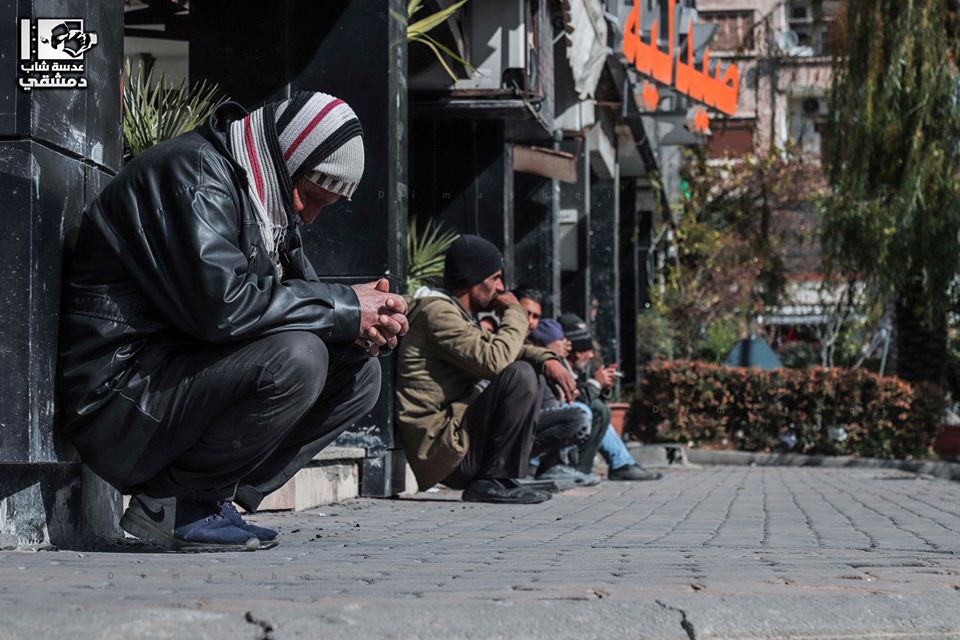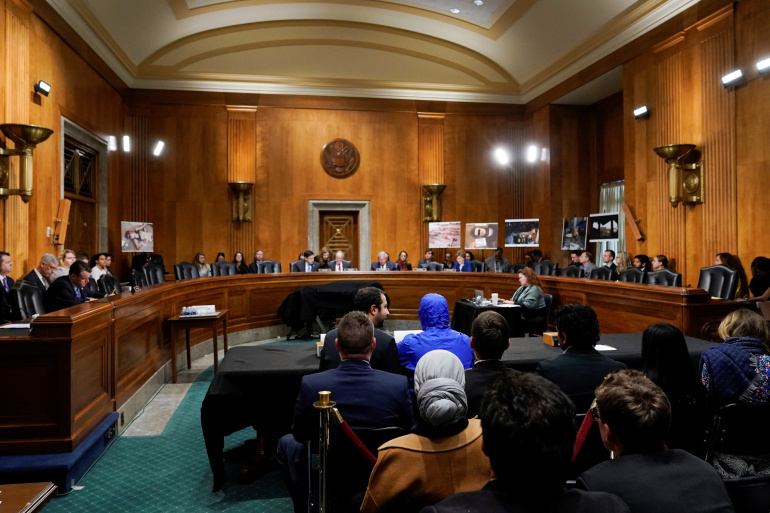Saleh Malas | Zeynep Masri| Khawla Hafezi
The phrase “Caesar Act” has caught Syrians’ attention and distracted them from the novel coronavirus (COVID-19) with the beginning of the current month, considering it to be the most prominent event that shaped their lives and affected their living conditions directly.
The act signed by the American President, Donald Trump in late 2019, was faulted for the Syrian pound’s decline which hit its lowest value in the recent history of Syria, based on what have been promoted by the American policy and what is widely circulated between Syrians in their daily conversations inside vegetable shops, cafes and family gatherings.
The “Caesar Act” comes at a time of crises and a number of factors which weaken the Syrian economy, and makes it unable to stand in face of the expected sanctions which will be imposed after mid-June.
In the present file, Enab Baladi discusses the impact of the act on the Syrian economy as well as the Syrian regime. In addition to a set of crises, which shock the Syrian economy. Enab Baladi attempts to discuss the possible ways to circumvent the act and to which extent the bill can achieve its expected goals.
“Economic Strangulation”
The Price of the Regime’s financial mismanagement paid by Syrians
Expanding the American sanctions under the “Caesar Act” sheds light on the main reasons behind the Syrian’s economy setbacks in areas controlled by Syrian regime. Although the law has not came into force yet, the Syrian pound witnessed an unprecedented collapse against the dollar to reach three thousand pounds during the first week of this month in which the law will take effect.
Such decline along its direct impact on markets, Syrians livelihood, has opened the door for questions on the essence of this law and about its imminent execution as well as the reason behind this premature economic “shock”.
Enab Baladi tackled these questions with experts and analysts and concluded a group of factors which led to the economy’s deterioration next to the “Caesar Act”, which still unclear for most of Syrians.
According to the Syrian economic researcher, Adham Kudeimati, he said that ” there is no such thing as financial policies or plans to save the Syrian economy in case of a crisis. It is rather policies implemented by gangs which run the country according to their interests.”
Such policies amid the imminent execution of the “Caesar Act”, may lead to a state of “economic strangulation” inside the regime’s financial institutions, according to Kudeimati. He explained that a shortage in supplies by the regime means that ” its sources have dried out”. Consequently, this leads to a high inflation in the country and explains the ” sharp hike” in the prices of food items.
In his talk to Enab Baladi, political researcher at the “Omran Center for Strategic Studies”, Maan Talaa explained that the policy of imposing sanctions on Syria is an old one, which has taken different shapes and forms since the beginning of the Syrian revolution in 2011. He added that “Caesar Act” is merely economic sanctions which will affect the regime’s economic activities rather than the Syrian people and their living conditions.
Talaa attributes the current Syrian setback to the regime’s mismanagement of financial and economic sectors, while he called it “a chronic systematic mismanagement” aiming at “legalizing the public money theft ” amid the absence of monitoring and accountability tools on budgets of the presidential palace, military and security institutions affiliated to the regime.
Useless “procedures”
The Syrian regime’s government has implemented procedures and a strict censorship on exchange companies and foreign remittances announced by the Central Bank of Syria (CBS) at the beginning of the current month.
Attempting to find solutions that could ensure the economy would not deteriorate further, President of the Syrian regime, Bashar al-Assad announced the dismissal of the Prime Minister, Imad Khamis and the appointment of the former governor of Deir Ezzor and Quneitra and Minister of Water Resources, Hussein Arnous instead until the Syrian People’s Assembly elections next July, which was postponed twice.
Khamis’ dismissal comes in the light of an economic crisis ravaging the regime’s government due to the depreciation of the Syrian pound which has crashed to its lowest levels and reached three thousand pounds against the dollar last week.
In the light of the current crisis, there has been raising calls for the government’s dissolution, as members of the People’s Assembly called last Sunday the government to assume its responsibility through protecting citizens and securing their livelihood.
Meantime, the head of banking operation in the Central Bank of Syria (CBS), Fouad Ali, on 10 of the current month, that “he struck the black markets hubs” to fight speculators to increase the value of the Syrian pound against the dollar.
The deterioration of the Syrian lira cannot be curbed through the measures implemented by the government of the Syrian regime according to Adham Kudeimati, who described it as “useless” as long as the regime keeps exploiting every development project to expand its influence.
Decree crippling the economic activity
Bashar al-Assad has issued a legislative decree that was the main reason behind the Syrian pound deterioration, according to economic analyst, Oussama al-Qadi. In reference to the legislative Decree No. 3 of 2020, issued in last January, which imposes tougher penalties for anyone dealing in foreign currencies in payments, any other form of trade dealings or cash payments whether through foreign exchange or precious metals.
Al-Qadi thinks that this decree has frozen small economic activities and led to the accumulation. Al-Qadi explained that “the Syrian regime thinks that the best way to heal a patient is through killing them”, as he put it.
Although the “Caesar Act” has not come into force yet, while it “has nothing to do with the current economic deterioration”, al-Qadi thinks that the law has prepared Syrians psychologically for the current situation.

A group pf young people looking for a job at Arnous Square in Damascus- on 19 February 2019 (a photo taken by a Damascene young man)
Contributed in the Syrian pound’s decline
Other nails in the Syrian economy’s coffin
In addition to the Syrian regime’s “mismanagement” to its financial institutions, which became more apparent with the act’s looming execution, the reality involves other emerging factors which have contributed to the weakening of the Syrian pound heavily.
According to the Syrian economic researcher and economic affairs editor in several Arab newspapers, Adham Kudeimati said, “there are several local, regional and international issues which led to the collapse of the Syrian pounds.”
Makhlouf’s conflict with the government
Kudeimati thinks that the Syrian lira is undergoing tremendous local economic pressure in the last period. This came in conjunction with Makhlouf’s video statements reflecting the huge rift between the business tycoon and the cousin of President of the Syrian regime Bashar al-Assad, Rami Makhlouf and the regime’s government. The tussle took place when Makhlouf was asked by government officials to step down as head of mobile operator “Syriatel” to the Syrian government.
Taking into account the rate exchange of Syrian lira against the dollar before and after Makhlouf’s video statements, one can clearly notice the impact of these disputes on it. Prior to last April, the exchange rate amounted to SYP 1250 per one dollar. While on 19 of last May, it amounted to SYP 1820 for a dollar according to figures by “Syrian Pound today”, a website for currency rates.
Dry up of regional economic support sources
Certain regional factors have an impact on the depreciation of the Syrian pound such as linking the Central Bank of Syria (CBS) and the already collapsed Central Bank of Iran (CBI) as a result of agreements between both parties, according to Kudeimati.
The deterioration of the economic situation in Iran due to the U.S imposed sanctions, along the faltering Russian economy amid the devaluation of the Russian currency, all led to a large decrease in the financial and military support provided by both Russia and Iran to the Syrian regime, as Kudeimati put it.
Investors’ expectations
The Syrian pound declined automatically prior to the act taking effect as many investors in the Middle East have abstained from dealing in Syrian lira, since “they know that within the determined date sanctions will be imposed on the regime, which could cause its bankruptcy. Hence, they abstain from lending the regime or buying its assets.”, according to what has been confirmed by the Syrian economic researcher and the member of “The Free Economists Syndicate”, Muhammad Moussa.
Syria’s economic gate collapsed…Lebanon’s banks
Lebanon was Syria’s economic gate to the outside world since mid-fifties of the last century; however, western sanctions on the Syrian regime have strengthened this role.
Once the Lebanese banks have imposed restrictions on dollar sales in August 2019, in conjunction with a ban on foreign currency withdrawals, a significant increase in the dollar’s exchange rate versus the Lebanese pound and Syrian one took place.
“Coronavirus” implications on the Syrian pound
The Syrian regime’s government has started easing the preventive measures implemented to curb the novel coronavirus (COVID-19) through resuming commercial activities and services and reopening all shops according to a weekly schedule, in attempts to revive the battered economy.
This was declared by the President of the Federation of Syrian Chambers of Industry and People’s Assembly member, Fares Shehabi, in one of his post on “Facebook” last April, where he that “reopening markets and mitigating precautionary measure came to save the economy.”
In the absence of accurate official figures to demonstrate the virus’ implications on the Syrian economy, Syrian regime’ attempts to mitigate preventive measures is a clear indication of the losses which hit the different economic sectors and affected citizens directly especially self-employed.
What is the “Caesar Act”?
The Caesar Act was signed by president of the United States, Donald Trump in December 2019, after it was passed by the U.S. House of Representatives, on 15 November 2016.
The law stipulates, which will come into force on 17 of the current month, to punish anyone supporting the Syrian regime and obligates the U.S. president to impose sanctions on al-Assad enablers.
The “Caesar Act” was named after the Syrian army defector using the code name Caesar, who leaked about 55 thousand images, showing the corpses of 11 thousand detainees who were killed under torture in 2014. The Federal Bureau of Investigation (FBI) confirmed that there was no evidence of digital manipulation and that those images were authentic. Back then, these photos aroused the public opinion and were displayed before the Senate.
30 days after the act comes into force, the American president must impose sanctions on Syrian regime’s foreign enablers as well as its military allies. These sanctions cover all kind of support whether it is financial, material or technical.
Moreover, sanctions will be imposed also on individuals providing the Syrian regime with technical services or information to help it maintain or expand its local production in natural gas and oil sector, the military aviation sector or in the construction and engineering sector directly or indirectly.
Such sanctions also include property seizure, prohibition of visas or any sort of benefits from immigration services along with cancelling visas of the Syrian regime enablers as well as imposing fines on them.
The act also imposes sanctions on top figures in the Syrian regime, including Bashar al-Assad and his wife, in addition to a number of officials in the security service and military officials in the air force and military intelligence. While the possibility of imposing sanctions on the Central Bank of Syria is still under study.
According to the Congress’ official website, after the bill takes effect, the U.S Department of Treasury will be assigned to monitor (CBS)’s activities to determine whether or not to take measures against it.
The law includes provisions to support Syrians such as providing support to licensed community organizations and facilitating humanitarian aid.
The American president may lift these sanctions in case the government of the Syrian regime and its allies stopped using the Syrian airspace to target civilians with explosive barrels, chemical weapons or missiles. Additionally, if it lift siege on certain towns and allowed access to humanitarian relief and medical care to all regions.
In addition to the release of all political detainees held forcibly in regime detention centers, while allowing full access to international human rights investigators into these detention centers. The government of the Syrian regime has also to stop targeting medical facilities, schools and residential areas as well as places of gathering.

Exhibition about detainees killed under torture photographed by the officer called “Caesar” (Reuters)
“Caesar”
Economic step with political aims
The purpose behind drafting the “Caesar law” intersects directly with Syrian activists demands who worked on passing the bill in the United States (U.S.), according to what political researcher at the “Omran Center for Strategic Studies”, Maan Talaa, talked about to Enab Baladi . The researcher described the law as “way to punish” the regime for its crimes against humanity.
These direct intersections achieve many goals for Washington, which Talaa divided into different sections. The first one is strategic management of the U.S. files in the Middle East. It turns out that imposing economic sanctions reduces the cost of American intervention in the region both in terms of finance and manpower. This also promotes the principle of “management from behind the scenes”, while upholding the American principles in any emerging policy in the region. Consequently, there is a political outlook in Washington’s support for economic sanctions to assess regimes for better negotiation terms.
The second level of goals has to do with imposing a complete embargo on Iran in Syria, as Talaa put it. The researcher added that this falls under a series of procedures aiming to “stifle Iran’s regional projects in Syria”. Talaa proceeded by explaining “we have all seen that the U.S administration of the former U.S. president, Barak Obama, has refused to discuss the law because it would stop negotiations and lead to the failure of the nuclear deal.”
While the third level has to do with the “Caesar Act” goals which can be categorized into two sections according to Talaa. From one hand, the first section has to do with preparing a set of constraining factors imposed on the Syrian regime in order to push it toward a political path represented by “Geneva peace talks on Syria” and the positive feedbacks with Resolution No. 2254. Hence, “Caesar” sanctions open the door for new American negotiations with the Syrian regime.
On the other hand, the second section revolves around Syria and the issue of the regime’s return on the local, regional and international stage. The act’s implementation coincides with the “war aftermaths”, most prominently the issue of rebuilding Syria. Therefore, “Caesar Act” in an economic move with political aims, as Talaa put it.
Talaa thinks that “Caesar” sanctions demonstrate the extent of Russia’s political interference with the Syrian regime, considering the act conveys “an American message to Russia which says that as long as the regime is not taking part in any political solution set by Washington, both Russia and the regime will face rough challenges”. Therefore, “Caesar” is a pressure tool on the Russian influence on Damascus. Talaa added that “Russia has started negotiations with the Americans to ease the pressure.”
Meantime, the U.S. and Russia held talks on “political settlement” in Syria a week prior to the act’s coming into force.
According to a statement by the U.S. State Department, on 11 June, James Jeffrey, the U.S. special envoy for Syria, spoke with the Russian Deputy Foreign Minister, Sergei Vereshenin, on the “political settlement” in Syria.
The statement explained that “Jeffrey discussed with Vershinin the political process to settle the Syrian conflict, in line with the UN Security Council Resolution No. 2254, which will achieve Syria’s sovereignty, independence and territorial integrity.”
Collapse of regimes cannot be attributed to economic sanctions, as Talaa believes, but it can be linked with the pressure placed on these regimes and pushing them towards political solutions supervised by Washington. In accordance with this principle, the “Caesar Act” signals the start of a series of negotiations that go in conformity with the American policy and not the economy’s collapse in Syria, according to Talaa.
No temporary solutions
Committing to the act’s provisions is the economy’s resort from collapse
In case Syrians witnessed a total collapse of their economy, this can be attributed to internal factors inside the Syrian regime which allowed security and economic networks to impose their control on the state and Syrians, as Maan Talaa put it.
There are some solid assumptions that the “Caesar” sanctions will fail to change the regime’s political conduct, instead they will be used to adapt Syrian institutions and uptake their capacities. This have helped maintain the regime’s survival since 2011 till now. According to Talaa, “Caesar, is not the reason behind Syria’s economic setbacks; however, it is an additional crisis to previously existed ones.”
According to the economic analyst, Osama al-Qadi, in order to address the harsh economic situation, Syrian regime must find a quick alternative system and cancel Decree No.3.
Al-Qadi added that “finding an alternative will not curb the occurrence of small or big collapses” due the fragility of the Syrian economy, which operates at only quarter of its productive capacity. Thus, the longer the economic crisis lasts amid an absence of a political solution, the economic situation will be even more difficult and this will increase the suffering of Syrians.
Al-Qadi thinks the “best solution” for the regime is to adhere to the provisions of the “Caesar Act”, yet “the regime will be in denial because of its stubbornness. The regime will also take the Prime Minister, the Minister of Finance and the Governor of the Central Bank of Syria as “scapegoats for its political and administrative failure,” such was the case with Imad Khamis who was dismissed from his position.
Economic researcher, Muhammad Moussa agrees with al-Qadi; and thinks that the only solution the regime can resort to is to boost the Syrian pound, through a long process which may take years. Restoring the Syrian lira’s confidence can be achieved through ending the war and re-establishing international ties with the world under a government which adheres to the Caesar terms. In addition to lifting sanctions and opening commercial points as well as adapting new flexible economic policies that go in conformity with new economic reality caused by war. This is not all, there must be also a central bank able to protect the Syrian lira, support traders, conduct export and import activities, along with the release of detainees and the return of refugees and internally displaces persons (IDPs).
“Temporary” support
The Syrian pound has been fluctuating under the influence of the strict measures and the regime’s tightened security grip, as well as the imposed restrictions on the “black market”. In addition to initiatives by Syrian traders to transfer “huge” sums of money into Syria in the absence of any statements by the regime’s government about these initiatives.
Researcher Muhammad Moussa pointed out that any support provided for the regime from allies to stop the lira’s decline will have a “temporary effect” and make it recover for a week or so before declining once again.
This was also confirmed by economic analyst, Osama al-Qadi, who thinks that regime allies can no longer provide support while things now are out of their hands, as their losses are estimated by 124 billion dollars for Russia and 24 billion dollars for Iran, in addition to their internal crises.
No more cash flow
Moussa pointed out that executing the Caesar law means imposing a complete siege on Syria, preventing import and export operations as well as bank transfers, which will prevent the regime from selling its treasury assets again, and its allies from lending the former or the CBS
Moreover, the Iranian support provided for the regime in form of oil derivatives and foreign currency has stopped because of the U.S and E.U sanctions imposed on Iran. This has prompted the regime to use its foreign currency savings to buy wheat and oil from Russia, which conducts its commercial activities with the regime in cash only.
Moussa added that Lebanon also is unable to provide the regime with foreign currency due to the crisis of Lebanese banks (involved in laundering the regime’s money).
While talking about the regime’s foreign currency sources, Moussa said that areas under the control of the Syrian opposition are a “major source” of funding, through exporting the Syrian lira to areas northern Syria, in exchange for the dollar secured from commercial activities which take place in the border crossings between Turkey and northern Syria.
Moussa believes if foreign exchange companies and traders have decided to limit their dealings to the Turkish pound or US dollar, and stop using the Syrian currency, it will be a devastating blow to Syrian regime.

Expressive image of Syrian and American banknotes in Idlib city- 2 June 2020 ( Enab Baladi-Youssef Gharibi)
Poor and penniless…what are the solutions?
The Syrian pound decline is directly reflected in the prices of goods and services. Usually, an increase in these prices in accompanied by a decrease in the purchasing power of citizens who seem to be in constant struggle with a list of goods and services they cannot afford due to the increase of exchange rate of foreign currencies against the Syrian lira.
According to al-Qadi, people inside Syria can be categorized into two different classes “the poor and the penniless” amid the absence of any other social class after successive “collapses” of the Syrian pound.
In 2011, the individual income was estimated at USD 300, “which was considered not enough”, now it has decreased to reach USD 30 only, thus “surpassing the extreme poverty line significantly”, according to al-Qadi.
Al-Qadi pointed out that in case a currency collapses, the state usually resorts to a more stable one. Consequently, setting two different currencies and exchange rates; where the first one linked to the national currency while the other one is linked to the foreign one.
For his part, al-Qadi thinks that Syrians living inside the regime controlled-areas have no options. This is mainly due to the Decree No.3, which limits their dealings and transactions to the Syrian pound amid high prices and significant fluctuations of the Syrian pound.
Dual Exchange Rate
Meanwhile, Syrians living inside the opposition held-areas, the only option they have is to use Turkish lira and dual exchange rate; the Syrian and Turkish, through empowering the Syrian Interim Government (SIG) to control exchange rates and monitor exchange markets and pumping funding (not less than half a billion Turkish lira monthly) into these areas, according to al-Qadi. This will create job opportunities where paychecks are in dollars or Turkish lira, depending on availability.
The same goes for areas controlled by the Kurdish-led Autonomous Administration of North and East Syria (NES), according to al-Qadi, who stressed the need for these currencies to be available for use.
Al-Qadi said that this not a currency substitution as “some might say”, but rather a dual currency pricing through the use of a foreign currency along with the national one until a political transition takes place and the recovery of the domestic currency. He pointed that both Lebanon and Mozambique implemented the same method, as well as some countries which have experienced similar circumstances such as wars and disasters.
Previously, the Syrian regime has tried to circumvent sanctions in three different occasions; in 1980’s when businessman and the head of “the Syrian Traders Association” (STA) in Kuwait, Fahad Khudair transferred “huge” sums of money into Syria to boost the Syrian pound. In addition, several media campaigns were launched to promote similar initiatives. This raises questions about the possibility of such conducts by the Syrian regime to circumvent sanctions.
Researcher Muhammad Moussa thinks that the regime has more than one way to circumvent the act’s economic sanctions. First, through establishing new companies under names of new people affiliated to it. A method which has been used by the regime repeatedly.
The second method would be through labeling phosphate fields along with Latakia and Tartus ports, allocated for Russian investments, as “free zones”, which will be used later as sources of financial support excluded from sanctions and not targeted by the Caesar law.
Moreover, the regime may exploit relief and humanitarian organizations, and use smuggling routes between Syria and Lebanon, which will not be exposed to the law, according to the provisions of the “Caesar” law. In addition to internal crossings linking its controlled areas to those of the “Autonomous Administration” and the Syrian opposition held ones.
According to Moussa, “circumventing sanctions will save the regime by no more than 20 percent”, because both the state and its economy have already “collapsed”. In addition, the “Caesar” law is a pressure tool and not to “destruction tool “, while the possibility of avoiding penalties is actually in the hand of the United States. It is possible that “the U.S. would turn a blind eye as it did before in previous occasions when imposing sanctions on both Iran and Venezuela.”
However, analyst Osama al-Qadi believes that circumventing the act’s penalties would be “very difficult”, if the Central Bank of Syria (CBS) was to be classified as a bank that supports money laundering. If so, the requirements for transparency, administrative and financial commitment before the U.S. Treasury and to the global financial institutions will rise. Consequently, all private banks will not be able to operate inside Syria.
Taking all this into account, the “Caesar Act” seems to strangle the Syrian regime and its economy in the light of all these crises. Meantime, the regime’s ability to resist and the effectiveness of its circumventing tools remain undetermined by press time.
if you think the article contain wrong information or you have additional details Send Correction
النسخة العربية من المقال
-
Follow us :












 The Caesar Act (expressive- edited by Enab Baladi)
The Caesar Act (expressive- edited by Enab Baladi)





 A
A
A
A
A
A










 More In-Depth
More In-Depth